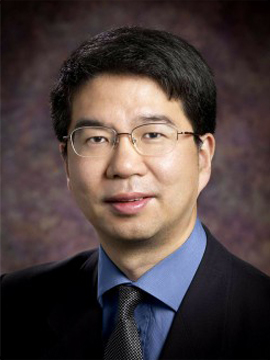
Chancellor's Professor, UCLA
Distinguished Visiting Professor, PKU
Chairman of Advisory Committee, Center for Energy-Efficient Computing and Application
Director, Center for Customizable Domain-Specific Computing
Director, VLSI Architecture, Synthesis, and Technology (VAST) Laboratory (former VLSI CAD Laboratory)
Co-Director, PKU/UCLA Joint Research Institute in Science and Engineering
Personal website: http://vast.cs.ucla.edu/people/faculty/jason-cong
JASON CONG received his B.S. degree in computer science from Peking University in 1985, his M.S. and Ph. D. degrees in computer science from the University of Illinois at Urbana-Champaign in 1987 and 1990, respectively. Currently, he is a Chancellor’s Professor at the Computer Science Department of University of California, Los Angeles, the Director of Center for Domain-Specific Computing (funded by NSF Expeditions in Computing Award), and the director of VLSI Architecture, Synthesis, and Technology (VAST) Laboratory. He also served as the chair of the Computer Science Department from 2005 to 2008.
Dr. Cong’s research interests include electronic design automation and energy-efficient computing. He has published over 400 research papers in these areas, including 10 Best Paper Awards (IEEE T-CAD’95, IPSD’05, HPCA'08, SASP'09, FCCM'11, FPGA’13, ISSS+CODES’13, ACM TODAES 2005, 2012, and 2013). He also received three 10-Year Retrospective Most Influential Paper Award at ICCAD'14, ASPDAC'15, and ASPDAC'17, respectively. He was elected to an IEEE Fellow in 2000 for "for seminal contributions in computer-aided design of integrated circuits, especially in physical design automation, interconnect optimization, and synthesis of FPGAs", and ACM Fellow in 2008 "for contributions to electronic design automation". He is the recipient of the 2010 IEEE Circuits and System (CAS) Society Technical Achievement Award "for seminal contributions to electronic design automation, especially in FPGA synthesis, VLSI interconnect optimization, and physical design automation." He received the 2011 ACM/IEEE A. Richard Newton Technical Impact Award in Electric Design Automation “for pioneering work on technology mapping for FPGA that has made significant impact to the FPGA research community and industry”.
In 2009, Dr. Cong led a group of twelve faculty members from UCLA, Rice, Ohio-State, and UC Santa Barbara and won an highly competitive NSF Expeditions in Computing Award (for $10M over five years). This award led to the establishment of the Center for Domain-Specific Computing (CDSC), which looks beyond parallelization and focuses on domain-specific customization to achieve drastic power-performance efficiency improvement. In 2014, Dr. Cong led the team won the very first award under the NSF Innovation Transition (InTrans) Program with additional $3M funding led by the Intel Corporation with matching support from NSF. This award supports the CDSC team to apply domain-specific computing to multiple critical applications in the health care domain.
Dr. Cong’s research publications have over 10,000 citations. According to Microsoft Academic Research, he ranked #4 in the field "Hardware & Architecture", which has 143,000+ authors. He is a frequent keynote speaker in major conferences in his fields, such as the IEEE Conference on Field-Programmable Technology (FPT'2005), the International Conference on Field Programmable Logic and Applications (FPL'2009), the IEEE Symposium on Application Specific Processors (SASP'2010), the IEEE International Conference on Application-Specific Systems (ASAP'2011), the Workshop on Synthesis and System Integration of Mixed Information technologies (2012), the Workshop on the Intersections of Computer Architecture and Reconfigurable Logic (2012), Intel Design and Test Technology Conference (DTTC'2012), the IEEE International Symposium on Circuits and Systems (ISCAS'2013), IEEE International Conference on Computer Design (ICCD'2013), and IEEE International Symposium on Low Power Electronics and Design (ISLPED'2014). Dr. Cong is also a distinguished visiting professor at Peking University (PKU) and co-director of UCLA/PKU Joint Research Institute in Science and Engineering.
Dr. Cong was the founder and the president of Aplus Design Technologies (1999 – 2003), a UCLA spin-off that developed the first commercially available FPGA architecture evaluation tool and physical synthesis tool, which were licensed by most FPGA companies and OEMed to their customers. Aplus was acquired by the Magma Design Automation in 2003 (now part of Synopsys). Dr. Cong was also a co-founder and the chief technology advisor of AutoESL Design Technologies (2006-2011), another UCLA spin-off that commercialized his research on high-level synthesis (HLS) for automatic synthesis of behavior-level C/C++ specifications into highly optimized RTL code – an effort that many EDA companies tried but failed for over two decades. The AutoESL tool (renamed to Vivado HLS after Xilinx acquisition in 2011) becomes the most successful and most widely used FPGA HLS tool in the history, with thousands of users, including many major corporations information technologies and top universities worldwide. He was a co-founder and the chief scientist of Neptune Design Automation (2011-2013), which produced the fastest and most scalable FPGA physical design tool at its time (acquired by Xilinx in 2013). Dr. Cong has also served on the Technical Advisory Board of a number of EDA and silicon IP companies, including Atrenta, eASIC, Get2Chip, and Magma Design Automation.
Dr. Cong has graduated 36 PhD students. Nine of them are now faculty members in major research universities worldwide, including Cornell, Georgia Tech., Peking University, Purdue, SUNY Binghamton, UCLA, UIUC, and UT Austin. One of them is now an IEEE Fellow, six of them got the highly competitive NSF Career Award, and one of them received the ACM SIGDA Outstanding Dissertation Award. Also, four of Dr. Cong’s PhD students were co-founders, together with Dr. Cong, of three startups originated from UCLA – Aplus Design Technologies (acquired by Magma in 2003, now part of Synopsys), AutoESL Design Technologies (acquired by Xilinx in 2011) and Falcon Computing Solutions (for customized computing of big-data applications). Others are in key R&D or management positions in various companies related to the information technologies, such as Amazon, Arista, Bloomberg, Broadcom, Cadence, Facebook, Google, IBM, Intel, Micron, Synopsys, and Xilinx.